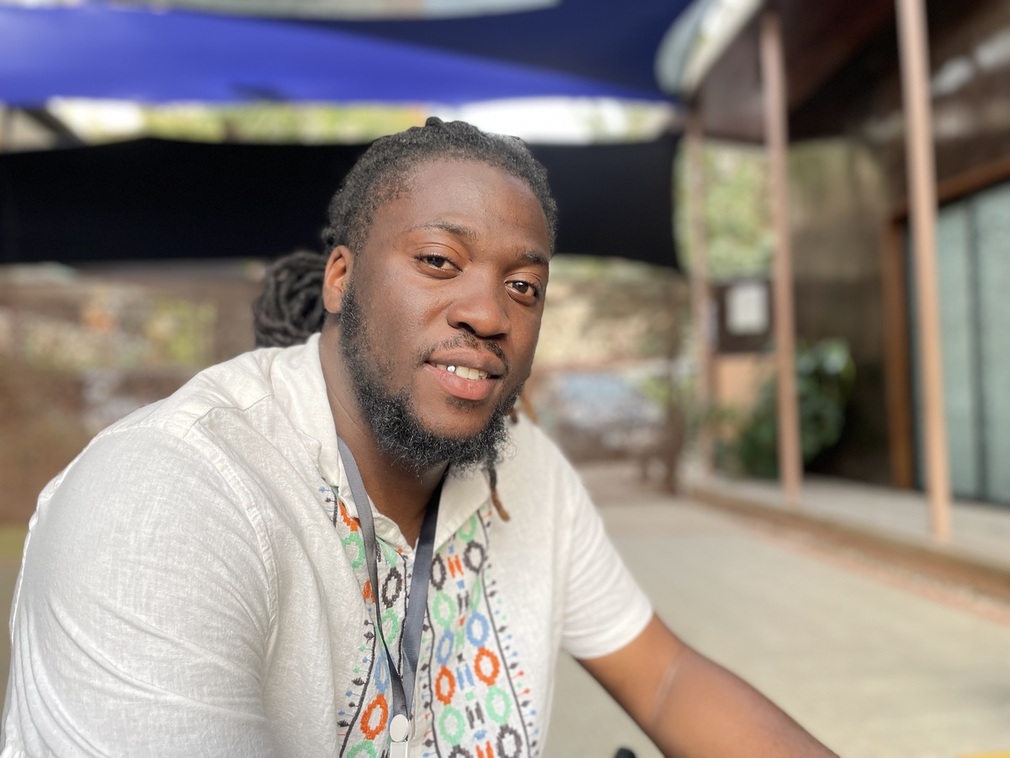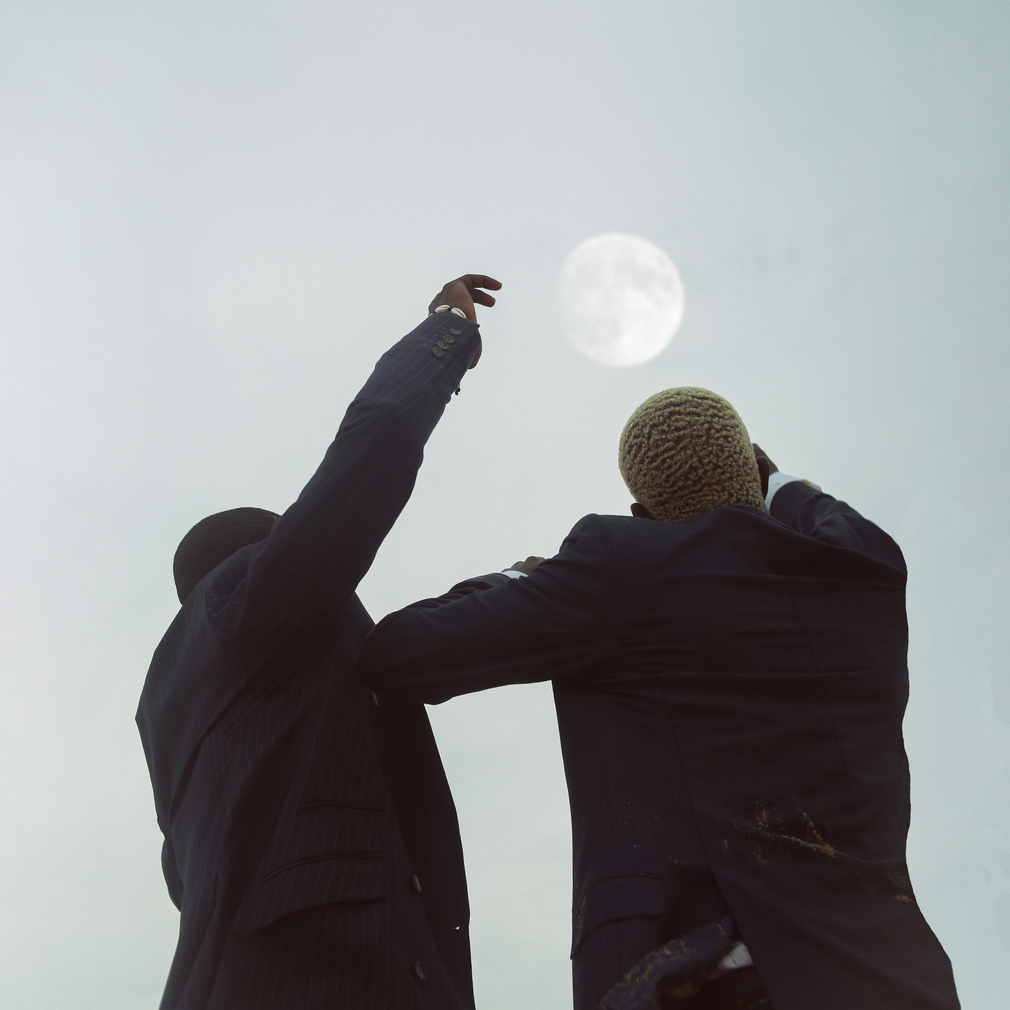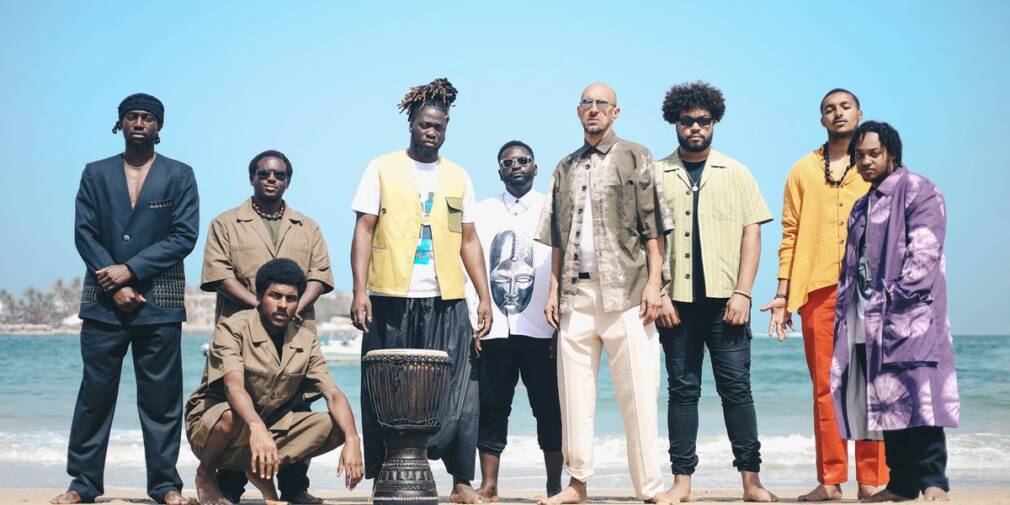Balimaya – meaning brotherhood, or kinship in the broadest sense in Malinké – is a London-based orchestra that brings together children of the great African diaspora and a few spiritual brothers with a passion for the sounds of the Black Atlantic. There’s blood kinship, and there’s heart and spirit kinship, and it’s the latter – and the djembe of its leader, Yahael Camara Onono – that unites the members of this excellent group.
“The djembe is used to unify people, to bring them together, and it’s the perfect instrument to lead the Balimaya Project,” explains the 31-year-old, who trained in London and Africa.
And it was he who took this band of excellent musicians (some of whom, like Kokoroko and Seeds, are among the best jazz bands on the London scene) on his quest to fuse jazz with West African music. His dual ancestry has helped him achieve this: his father is Camara, a Malinke from Senegal, and his mother, a Hausa and Igbo, was born in eastern Nigeria. In other words, two very powerful poles of attraction in terms of musical traditions and creations. The Mandingo sun was undoubtedly strongest in the nurturing of Balimaya, with Yahel Camara Onono leading the orchestra by playing face-to-face, using the djembe to guide the music and speak to his musicians. The result is an explosive, rich blend of traditional percussion and brass, kora and guitars, balafon and keyboard, all weaving a hand-sewn fabric rich with flamboyant motifs. After Wolo So, their debut album released in 2021, Balimaya released When The Dust Settles this summer. A more sedated, meditative and intimate record, subtly surfing the nuanced ocean of emotions. Prior to its release, we were able to attend their concert at the Dakar Music Expo, their first on the African continent and undoubtedly the festival’s finest. Before he took to the stage, PAM sat down with Yahael Camara Onono to talk about Balimaya’s origins, philosophy and the relationship between jazz and Mandingo music.
Yahael, you were born in London 30 years ago: not many city kids, especially outside the continent, are steeped in tradition. How did you get into the world of traditional music and Mandingo percussions?
Well, I was very lucky to have a family that was very much involved in music and arts in the first place. And also traditional music as well. My granddad played the talking drum, the Tama. My mum, when she was younger, used to dance in the National troupe. So when I was around the age of five six, they could see that I was always drumming on something. The pots and pans, everything. I was really into it and my granddad bought my first Tama. I was very small. It was like my toy, I took it to bed. When there were ceremonies I’d be in the back playing. Even the drummers had to tell me to stop. Then, when I was around eight, my mum bought me a djembe and since then I just always wanted to play djembe. I used to come on holiday often as a kid back home, so I was lucky to go back to West Africa often. I really got into it that way.
Did you learn on your own or did you have a mentor?
At first I was very much by myself just listening and copying stuff. Then as I got older and became more and more motivated and more intentional, I started looking to other masters that were in the UK. The person that initiated me into traditional djembe is Mr. Sidiki Dembele. He’s an Ivorian player of Malian heritage, very well known in the djembe world and beyond. He’s the one that really took me under his wing and initiated me in the traditional way.

How did you come to build Balimaya?
My project was born out of several reasons. I was living in Dubai, in the UAE for a couple of years, and I was playing there. I was a professional percussionist. And not only just traditional music, but playing jazz and trios and stuff like that and Latin jazz as well. I noticed that the Afro Latin and Cuban music and other percussion styles like Indian classical music, Carnatic music, is highly valued. There’s a lot of attention on them and they are revered at a higher level, whereas the most complex level of percussion music with complex measures of musicality to me is the manding found in West Africa. For me, I was like, “why are we not getting the same recognition? Is it because we don’t know how to articulate what we want to do to certain audiences?” And you find that you’re in a position where you’re of the continent, but you’re also of the diaspora, you’re of the mindset of the continent, but you’re also of the mindset of the diaspora. That also means that you know how to communicate with both. It’s code switching.
So when I was in Dubai, I had a really good friend of mine, an amazing guitarist. He’s in New York and his name is Olawale and we were mixing Manding music with funk. Then I left Dubai and I was playing all over the London jazz scene, and I noticed that because it was a lot of young black kids, especially West African music, things like Afrobeat and highlife were becoming quite popular.
Highlife influenced the jazz that was coming out of the capital. And so I found myself very much in demand. But I wasn’t with the real it wasn’t the real necessarily essence of what it means to use folkloric percussion in the way it’s supposed to be used, as opposed to a leading instrument that’s at the top of an ensemble, is used almost like a gimmick. And also there wasn’t that depth of understanding of the music that’s present in the capital as it is maybe in places like the States or outside of Africa, in the States or in France. You go to Paris, there’s a huge Malian or Ivorian, Burkinabe, Senegalese community very much steeped in the culture there. And I said, I really don’t want to do my own music, but I don’t want to do just traditional manding because I didn’t grow up with traditional manding. I grew up in London. And growing up in London, my experiences of jazz and funk were also like folklore to me because I grew up with it. So I wanted to find a way where I could merge the two worlds successfully, where it would accurately portray my kind of trajectory in terms of music.
And one day I just said, okay, I’m just going to do it. And I saw my friends that I’m still playing with us now. I said, okay, guys, I want to do something. I need a rehearsal. Can we just try something like this out? And I think all of us came to a room at the time. It was about 10 or 9 of us in the Royal Academy of Music in 2019. And from there that’s where we went. And then we rehearsed for almost a year and we had our first show, Jazz Refreshed Night, I think it was in Brick Lane. And Adam from Jazz refreshing had always been saying to me, “Hey, why don’t you do your own thing? We’re waiting for you because you’re playing for everybody else.” At the time, I was touring with eight bands, and I was exhausted and he was like, “Why don’t you do your own thing, man?” And I was always a bit complexed about it. And then it got to a point where I said, I know I want to hear it. I’m also tired of seeing people go, “Oh, I’m going to a night and I’m going to listen to African music.” What does that mean? You’re going to hear Salif Keita? Are you going to hear Ladysmith Black Mambazo? You’re going to hear ndombolo or Mauritanian music? What does that mean? How about we have something that’s very specific and very specific to a certain culture and reflects a certain instrumentation? While staying true to the trajectory is taking in the diaspora and putting that forward. And from those different factors is where Balimaya project was born.
Was there also this idea of building something truly Pan-African?
Yes and no. Pan-African in the sense that I wanted it to be mainly young black men because I wanted us to be reflected in the music. And it’s pan-African because mandinge music is contemporary. It’s a living culture. And therefore, the music that is manding music today is influenced by our traditional manding music played by the griots, but also by Congolese rumba, also by Afro-Cuban music and so on. And all of those elements are present. In Balimaya project we have a Congolese guitarist and bassist, and even though they play manding parts, they play with the Congolese flair, and it adds a difference to the music. I’m half Nigerian, so I grew up with Fuji, I grew up with Apala, I grew up with Igbo highlife, I grew up with Ghanaian highlife and all of those things also influenced manding music and contemporary manding music today. So in a way, it is pan-African, even as a genre. But then I also wanted something to be very clear and specific. This is mandingo, it’s not Afrobeat. It’s manding based and lead, with influences of jazz.
Has Balimaya ever played in Africa?
No. This is our first time playing in Africa.
It must be meaningful to come and play here in Dakar…
Ah, it’s very meaningful! It’s very, very emotional for me as well to be able to bring not only my brothers and our sister (our tour manager) back home as a homecoming and showing them where things are. But to be able to present what we’ve been doing, you know, it’s one thing when you see people’s reactions online, they go, wow! But it’s another thing to play and see, just after the soundcheck, people come up to us and said, “What have you been doing with the music? We haven’t heard it in this way before”. It’s so interesting. It validates what we’ve been doing and how I’ve been seeing things. And so it’s very emotional. It’s very powerful. It’s a milestone for me personally in my career.
You have been recording a new album. Can you tell us about it?
Our second album is called When the Dust Settles, and it’s very different from the first album. It’s more abstract. It’s more introspective. It’s more of a look at emotions and our specific journeys. Not a broad general feeling, but our feelings of grief and hurt and resentment and anger and joy and progress as a band and as young black men growing up in London and different places in the diaspora we have had to deal with personally and as a community. And yeah, I think people see it as something that’s very different, but also growing and mature. You can see that we’ve played together and everyone is finding their place.
In the band there are two profiles: the guys that are coming more from tradition, the others that come more from a jazz background. Jazz is like a tree with many branches, it is deeply linked to its African roots in a way, even if sometimes it’s not conscious. Do you think the music you make, it’s like a perfect encounter of the tree, the roots and one of his branches?
I think it is a coming together of sorts. Jazz is heavily linked to manding music. Manding music is heavily linked to jazz, and we can’t take away from that. And even though they are kind of separate, they’re also together. But it’s just they’ve become now two separate genres, two distinct things like Thieboudiene and Djollof rice. You know, everyone talks about Jollof, saying “it’s better, it’s the real one”. But Jollof Rice has become a meal on its own, you know? So you can’t compare it to thieboudienne. There’s good thieboudienne and there’s good jollof, you know?
If you look at the blues and jazz and all of that, and we look at even gospel and we look at the way vocalists work with the instruments, the first instrument in manding music is the voice. We look at the way they phrase and even the swing (he sings a rhythm). It’s the same swing, you know, the same sense of intricate timing, the same kind of micro rhythms and micro timing that is essential in jazz music that makes a change and changes an expression and changes a tune into something different. And the sense of rhythm is very much present in manding, the sense of dexterity and the innovation in terms of your instruments is very much manding.
Improvisation too…
Improvisation as well. You look at some of the most amazing guitar players: you go to Mali, you look at Modibo Gaucher. You look at Gaoussou Cissokho. Modibo Diabaté, you look at Cheikh Niang who’s now very present in the Senegalese scene, but he’s a malian guitarist. All of these guys are inspired by jazz, but not just jazz, by black diasporic music. Jimi Hendrix is a huge influence for many people in West Africa. So, it’s all a circle. It’s just about finding our way around it and finding the links that work and making it stick together.





